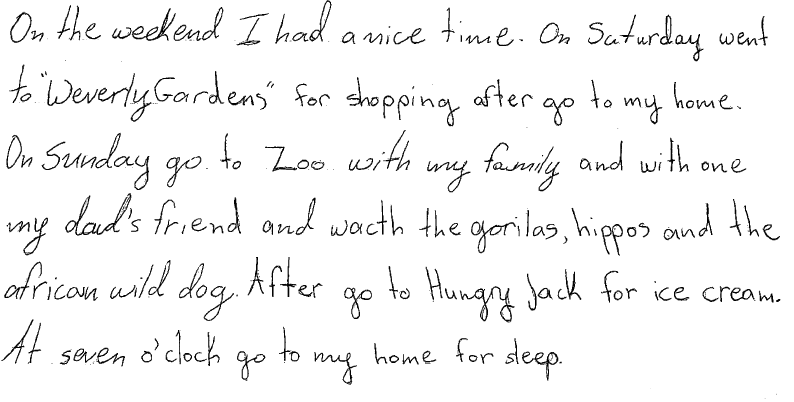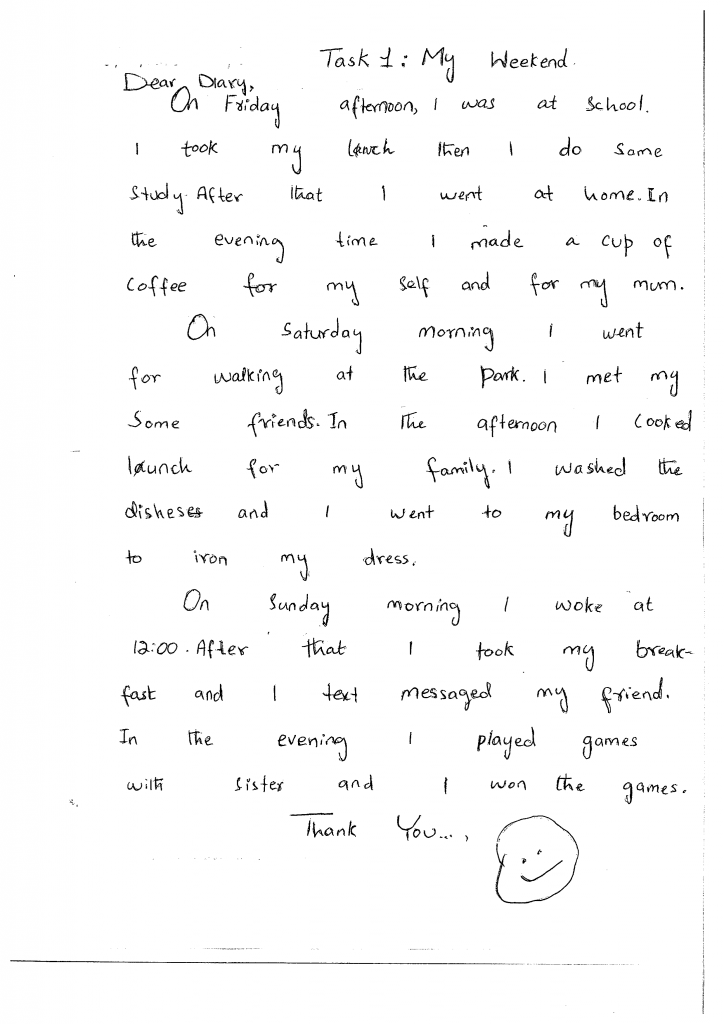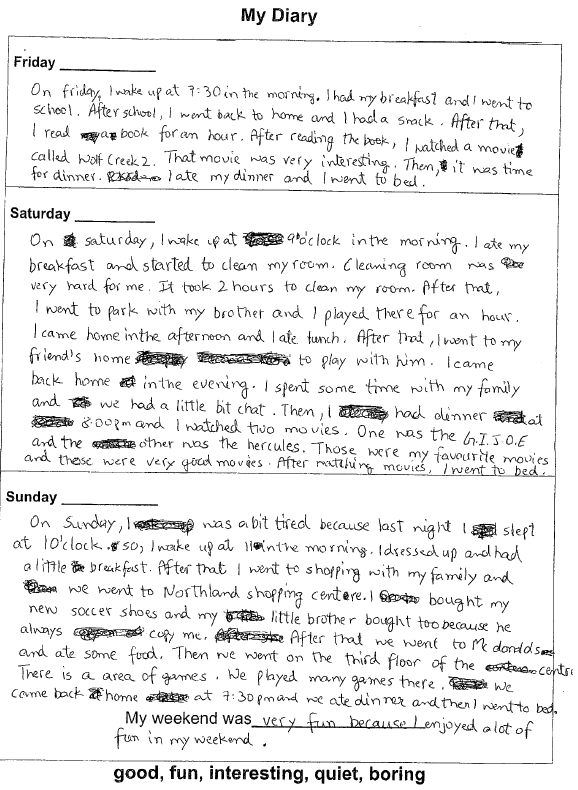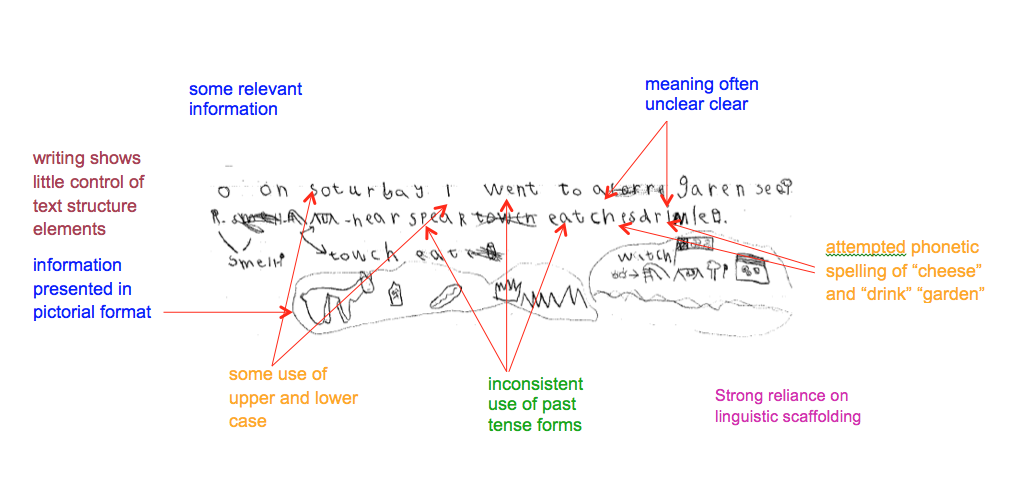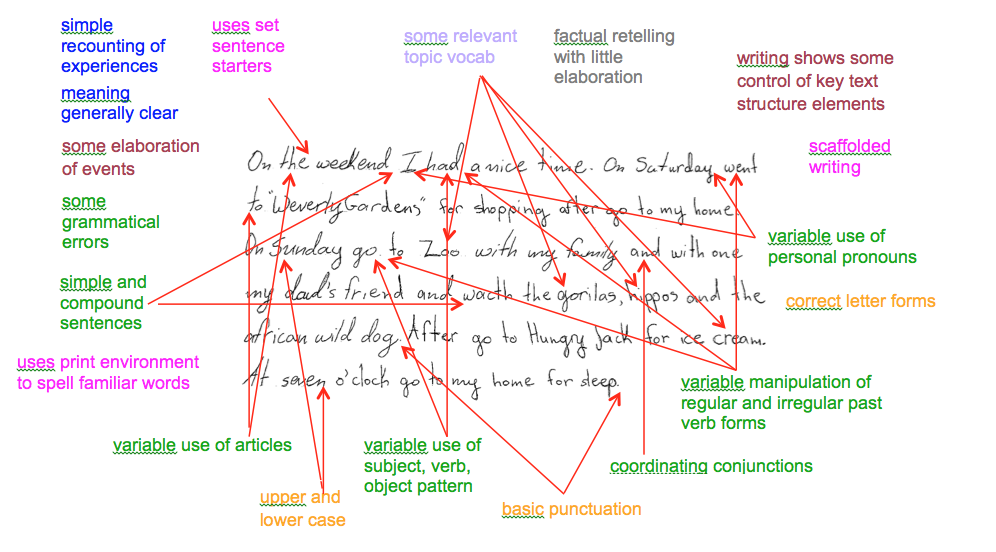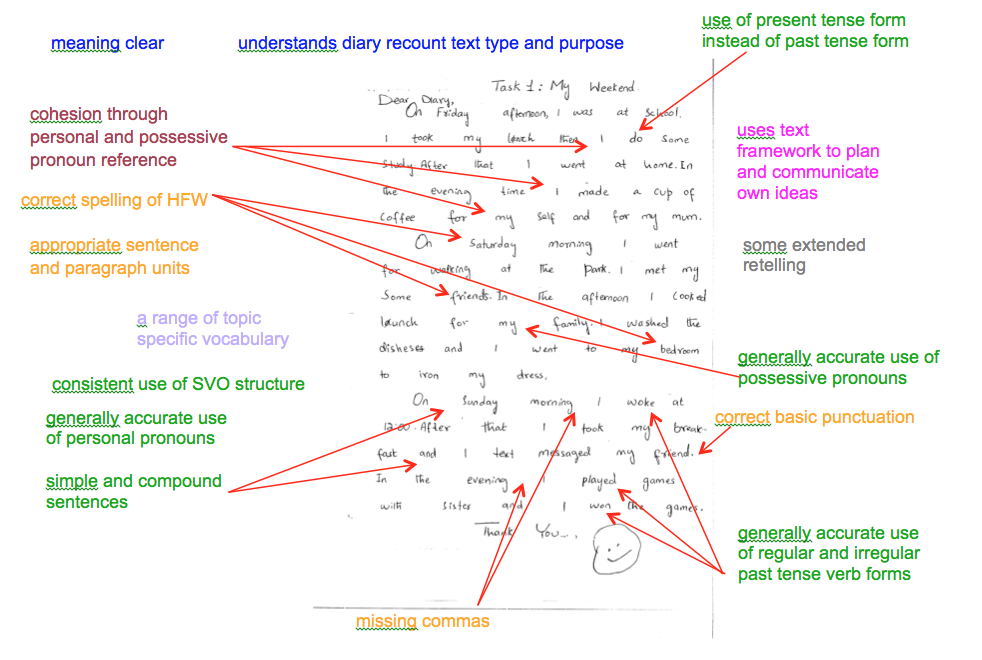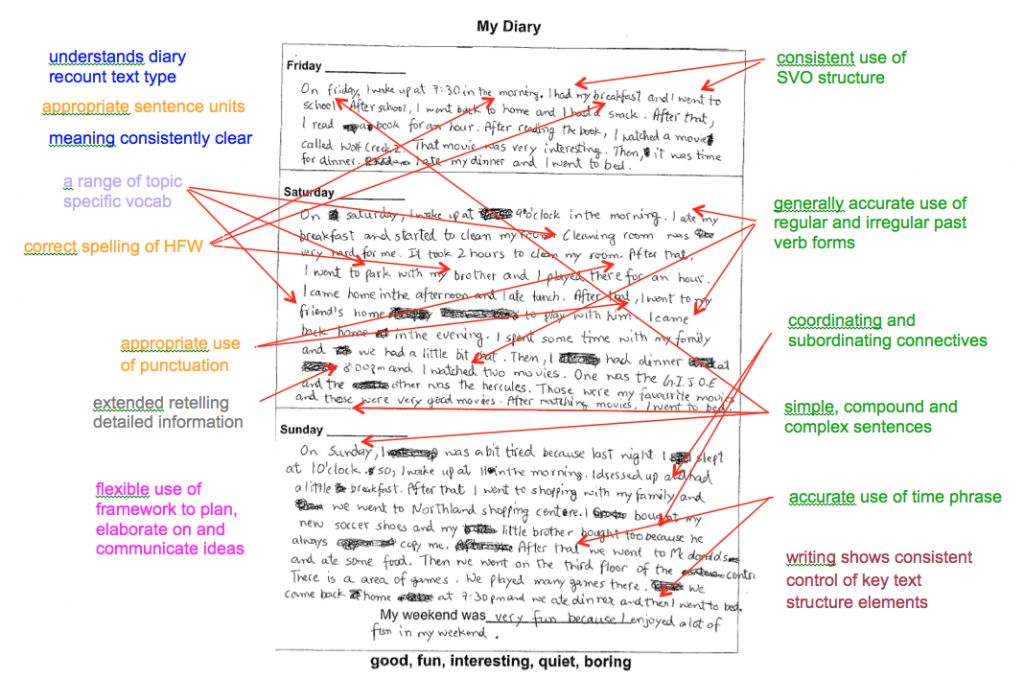1. My weekend
Please click on the toggles below to navigate through information on this assessment task and reveal the links for downloading task materials.
Task details |
|
| Name of writing assessment task | My weekend |
| EAL curriculum level range | A1, A2, BL, B1, B2, CL, C1, C2 |
| Text orientation | Informative |
| Task type | Extended response |
Task specification |
|
| Purpose | To assess students’ ability to write basic information about their recent past experiences. |
| Description | Students complete basic sentences about their weekend activities. |
| Assumed knowledge and description |
|
Learning/teaching context |
|
| Language centre/mainstream class | EAL support |
| Subject/key curriculum objectives, outcomes | English |
| Topic/teaching unit | Everyday activities, days of the week |
| Assessment conditions |
|
| Notes |
|
Task implementation |
|
| STAGE | ACTION STEPS |
| Pre-assessment activity |
|
| Assessment activity |
|
| Post-assessment activity |
|
Click below for the unannotated assessment criteria:
- TEAL Writing Task 1- unmarked criteria sheet [PDF]
- TEAL Writing Task 1- unmarked criteria sheet [Word]
An explanation of the purpose, nature and use of criteria sheets is available at 4. Using the assessment criteria.
Purpose and value of task
This task assesses students’ abilities to write about the activities they do in out of school contexts. Diary/journal writing and talking about what students do on the weekend or after school is a common way of encouraging students at early Stages of English language learning to communicate. This kind of recount also assists them to learn useful vocabulary sets such as the days of the week, times of the day and night, and the names of activities and pastimes. It also gives them experience in hearing and using the simple past and future tenses. At the earliest Stages, students are often given simple templates to structure their diary/journal writing, and this provides them with the support they need to produce a written text. This task is related to the TEAL Oral Task 1: My Weekend.
Contextual information
The students in the samples had all had many experiences with talking and writing simply about their weekend and after school activities.
Commentary
The students are all at were able to communicate basic information about their weekend or after school activities.
The students vary in age and ability to write in English, with Sample 1 showing a student still developing basic skills, and using illustration as a means of adding detail to the text. Although the students in the other samples are able to write much more, their approach is quite formulaic in the way that they list activities without giving much additional detail or elaborating on why they did these activities, or whether they enjoyed them. Students, particularly older students who have a basic command of this genre can be assisted to move their diary/journal writing towards more interesting and introspective texts through modelling, and discussion about what might interest a reader or what they might want to record about their thoughts or feelings.
Annotations, commentaries and feedback for Task 1: My weekend
Commentary
This sample shows an understanding of the task and an intention to tell the reader about a weekend experience in a garden or a park. The meaning of the text itself is often unclear (‘garen’ = ‘garden’ but more likely refers to a ‘park’, ‘ches’ = ‘cheese’ and ‘drimk’ = drink), and the student has attempted to express meaning visually through drawings.
The text shows that the student is still at an early stage of writing, can only express simple ideas, based on models, and does not yet have the vocabulary (or the ability to write more extensively) to elaborate on them. The spelling of high-frequency words is inaccurate, however the student has attempted to spell some words phonetically – ‘ches’ for cheese and ‘drimk’ for drink.
The student is able to form most letters correctly and uses both upper and lower case letters.
The student is reliant on teacher support to accomplish the task.
The marked criteria sheet shows that the student meets most criteria at level 1 of performance.
The student's language use in this task is consistent with the descriptions of students at Level A1, Victorian Curriculum F-10 EAL.
TEAL Writing Task 1 – Criteria sheet – Sample 1
Using this assessment for further learning
(Select the points you think are currently of most importance to the student.)
- Ask the student questions about her weekend experience based on the writing and the pictures drawn. Encourage the student to verbally explain what happened. As you do so elicit or provide the words the student needs to express meanings. List pronouns, verbs and nouns in different columns and colours so the student understands how they link together:
On Saturday….
|
Person I |
Verb (to go to) went to (to smell) smelt (to hear) heard (to eat) ate (to drink) drank (to see) saw (to go on) went on |
Noun the park some flowers some children some cheese some milk some trees some grass some birds some swings |
- See if the student can tell you what was done on Sunday and repeat the process above.
- Give the student time and support to write and illustrate another draft, using the columns you have built up together. Add the product to the student's portfolio.
Commentary
This sample shows an understanding of the task. The text is a short, simple, factual recount of experiences with some elaboration. The writing shows some control of key text structure elements, events are sequenced in time and relevant weekend activities are described. There is variable control of past tense verbs with the use of ‘had’ in the opening sentence and ‘went’ in the second sentence. However ‘go’ used instead of ‘went’ for the rest of the recount, and ‘watch’ instead of ‘watched’ is used, showing that this student is only beginning to use simple common past tense forms.
The student has used the correct subject, verb, object pattern in the first sentence but omits the subject personal pronoun ‘I’ in the rest of the recount. The sentences are generally simple in structure though there is an attempt at a compound sentence in the first Sunday entry: On Sunday go to Zoo with my family and with one my dad’s friend and wacth the gorilas…’. The student has successfully expressed a complex possessive ‘my dad’s friend’, not included in the criteria for this task but worth noting in this sample. Articles are generally used accurately. There are some grammatical errors with past tense verb forms, prepositions and missing personal pronouns in subject position.
Correct letter forms are used, including upper and lower case. Familiar words are generally spelled correctly, with a good attempt at the spelling of more unfamiliar words such as ‘gorilla, hippos’ etc. The student copied the opening sentence but wrote independently using a model.
The marked criteria sheet shows that the student meets most criteria at level 2 of performance.
The student's language use in this task is consistent with the descriptions of students at Level B1, Victorian Curriculum F-10 EAL.
TEAL Writing Task 1 – Criteria sheet – Sample 2
Using this assessment for further learning
(Select the points you think are currently of most importance to the student.)
- The student has clearly understood the task and the text type and has written a simple, factual recount of his weekend activities. However, encouragement and practice will substantially extend the student's writing ability. During conferencing, via teacher questioning, the student should be encouraged to provide more interest by adding more details about the weekend activities. The kind of questions the teacher might ask could be:
- What was it like at Waverly Gardens on Saturday? Was it busy/crowded etc?
- Who did you go with?
- What did you buy?
- Which animals at the zoo did you prefer? Why?
- What did the gorillas / hippos / wild dogs do?
- What flavour ice cream did you have at Hungry Jack’s?
- Did you have anything else to eat there?
As the teacher elicits more ideas, s/he could note the ideas for the student OR encourage the student to record them so that they can be added to the next draft.
- Perhaps point out some grammatical issues such as the following:
- Past tense verb form:
- To go / went: On Sunday I went to the zoo
- To watch / watched: We watched the gorillas
- Past tense verb form:
- Subject position:
- On Saturday I went to Waverly Gardens
- On Sunday I went to the zoo…
- On Saturday we watched the gorillas
- Sequencing events in time
- After that (Waverly Gardens) we went home
- After that (the zoo) we went to Hungry Jack’s for ice cream
- Expressions:
- ‘To do some shopping’ rather than ‘for shopping’
- ‘To sleep’ rather than ‘for sleep’
- Give the student time and support to write another draft. Add the final product to his/her portfolio.
Commentary
This sample shows an understanding of the task and text type and consistent control of text structure elements. Events are recounted in a logical, chronological sequence, time phrases and sequential markers are used throughout. There is some extended retelling of events but not very much elaboration. The text is cohesive mostly through personal and possessive pronoun reference and time markers.
There is consistent use of the subject verb object sentence pattern throughout and a generally accurate use of regular and irregular past tense verb forms. There are simple and compound sentences in the text but little use of adjectives or adverbs to extend the description of weekend events. There are occasional grammatical errors with prepositions and tense.
The student has used a range of topic-specific vocabulary for weekend activities, but needs to make more use of adjectives and adverbs to extend the description of events. The spelling of high-frequency words is accurate and there is evidence of correct basic punctuation. The sentence and paragraph units are appropriate. This student has made use of the framework to plan and communicate her own ideas.
The marked criteria sheet shows that the student meets most criteria at level 3 of performance.
The student's language use in this task is consistent with the descriptions of students at Level B2, Victorian Curriculum F-10 EAL.
TEAL Writing Task 1 – Criteria sheet – Sample 3
Using this assessment for further learning
(Select the points you think are currently of most importance to the student.)
- The student has written confidently and logically and has clearly understood the task and the text type. During conferencing, via teacher questioning, the student could be encouraged to provide more interest by adding more details about her weekend activities. The kind of questions the teacher might ask could be:
- What was it like in the park on Saturday?
- What did she do with her friends in the park?
- How did it make her feel being with her friends in the park?
- What did she cook for lunch on Saturday afternoon?
- Did her family enjoy the lunch?
- How did she feel when she won the games she played with her little sister?
- How did her little sister feel?
As the teacher elicits more ideas, s/he could encourage the student to record them so that she can add them to the next draft.
- Perhaps point out some grammatical issues such as the following:
- To do some studying / did some studying
- I went home (no need for a preposition before ‘home’)
- I had my breakfast (rather than ‘took’ my breakfast)
- Give the student time and support to write another draft. Add the final product to his/her portfolio.
Commentary
This sample shows an understanding of the task and text type and consistent control of text structure elements including an extended final comment. Events are recounted in a logical, chronological sequence, and time phrases and sequential markers are used accurately throughout. There is extended retelling of events in relation to movies watched, household tasks done, socialising and shopping. The text is cohesive through the tense used, and the use of personal and possessive pronoun reference and time markers.
There is consistent use of the subject-verb-object sentence pattern throughout, and a generally accurate use of regular and irregular past tense verb forms with the exception of the verb ‘to wake up’ / ‘woke up’ . There are examples of simple, compound and complex sentences in the text but little use of adjectives or adverbs to extend the description of weekend events. There are a few grammatical errors.
The student has used a range of topic-specific vocabulary for weekend activities, but needs to make more use of adjectives and adverbs to extend the description of events. The spelling of high-frequency words is accurate and punctuation is used appropriately throughout. The sentence and paragraph units are appropriate. This student has made flexible use of the framework to plan and communicate his own ideas and required little teacher support.
The marked criteria sheet shows that the student meets most criteria at level 4 of performance.
The student's language use in this task is consistent with the descriptions of students at Level C2, Victorian Curriculum F-10 EAL.
TEAL Writing Task 1 – Criteria sheet – Sample 4
Using this assessment for further learning
(Select the points you think are currently of most importance to the student.)
- The student has written confidently and logically and has clearly understood the task and the text type. The student may need some encouragement to vary and extend the writing beyond just elaborating on meals and movies. During conferencing, via teacher questioning, the student could be encouraged to add more variety to the events he describes. The kind of questions the teacher might ask could be:
- What was it like in the park on Saturday?
- What did he see in the park?
- What games did he play with his brother?
- Did he enjoy playing with his brother? Why / why not?
- What did he do at his friend’s home?
- As the teacher elicits more ideas, s/he could encourage the student to make a note of them so that he can add them to his next draft.
- Perhaps help the students to notice some grammatical issues such as the following:
- To wake up / woke up
- I went home (no need for the preposition ‘to’ before ‘home’)
- Repetition of ‘clean my room’. Use ‘this’ or ‘it’ to refer to the whole process: ‘This’ was very hard for me. ‘It’ took me two hours
- I enjoyed the weekend and had lots of fun (rather than ‘I enjoyed a lot of fun’).
- Give the student time and support to write another draft. Add the final product to his/her portfolio.

